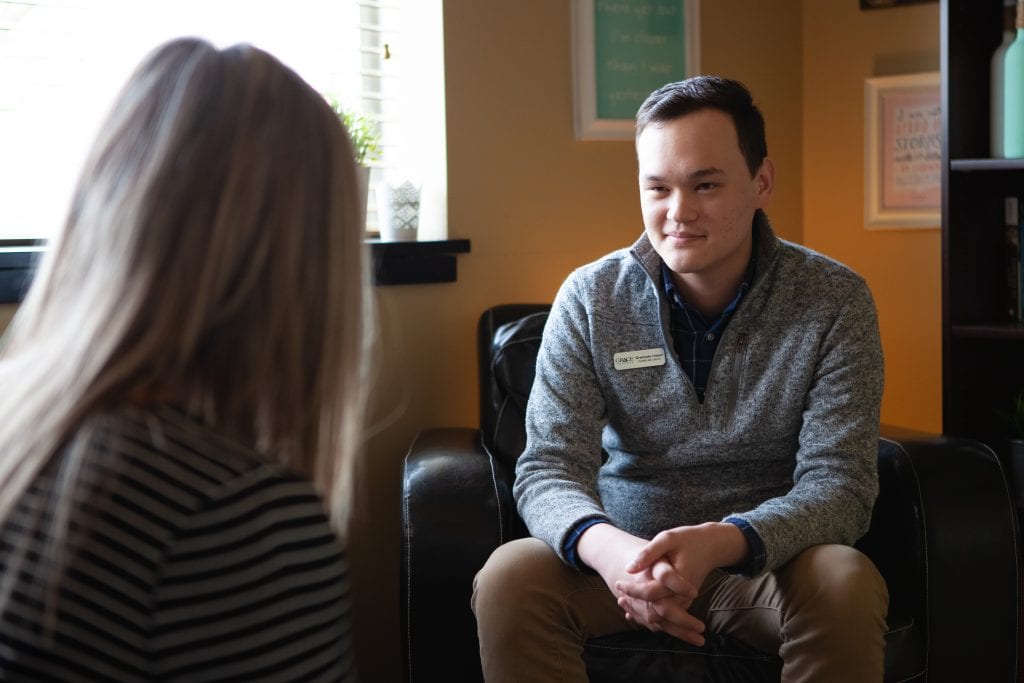
10 Thoughts about Mental Health for College Students in an Upside-Down World

Mental health in college isn’t always talked about. As a student moving out on your own, for perhaps the first time, there is a plethora of emotions and thoughts that come with the adjustment into a new stage of life. Add a global pandemic and a shortened college semester on top of this, and the transition can be overwhelming. Mental health for college students is a rising topic in this time of uncertainty, but unfortunately, the topic, too often, remains taboo. Dr. Deb Musser, Director of Student Health and Counseling at Grace College, is here to share her thoughts about mental health in college and how college students can care for their mental health in an upside-down, pandemic world.
Common Misconceptions about Mental Health for College Students:
“My pain isn’t as big as someone else’s.”
Deb often hears students invalidate their own pain because they think others suffer much worse. But comparing your pain to someone else’s isn’t helpful. According to Deb, “Pain is pain. If we stack it side by side, we get into comparison games that aren’t fair.” Your pain is valid and it is just as important as the next person’s.
“I’m the only one who struggles to this depth.”
There is another side of comparison that is just as dangerous. When college students see peers on campus laughing and having fun together, it’s easy to think that they are alone in their struggle. But this is a misconception. Everyone has their own struggle. “To know that I’m not the only one that has to figure out a really upside-down world can be freeing for students,” Deb says.
“You only go to counseling if you’re crazy.”
According to Deb, our world has grown in the understanding of the need for counseling, but there can still be fear or stigma that accompanies it. Mental health for college students needs to be a normalized conversation. There are many students who feel like they don’t have permission to go to counseling, often because of a role that they play on campus or a reputation they want to uphold. It may feel like you have to be in serious risk to consider counseling. We need to break these barriers down and open up the doors for everyone in distress and who is in need of counseling.
“If I do the right things, I won’t have pain.”
Another misconception is that doing the right things, such as reading the Bible and making good choices, should eliminate pain. However, this is not true. Throughout the Bible, those who loved Jesus and followed him devotedly were often facing trials, hardship, and all sorts of pain. Having faith makes a difference in your mental health because you have hope to hold onto; but it doesn’t make you immune to pain, and it shouldn’t stop you from seeking help
“If I go, will someone know?”
Many students are afraid of their private information being known and spread by others. Even just the thought that people might know a student is receiving counseling can prevent him or her from going. At Grace College, your confidentiality is taken seriously. Our counselors are legally required to keep your information secure, unless it involves a serious risk to yourself or others; involves minors who have been or are: neglected OR who are in physically, emotionally, and/or sexually abusive situations; or the student is a minor him/herself. You can feel free and safe to discuss any mental health concerns with your counselor without fear of your privacy being invaded.
How to Take Care of your Mental Health in College:
1. Create a routine.
“Having a structure that gives meaning to each day can help,” Deb says. She encourages students to develop normalcy into their schedules so that motivation and purpose can remain constant.
2. Practice deep breathing.
Big, full breaths calm the mind and body down and help us to think from a clearer perspective. According to Deb, deep breathing sends a message to your body that helps you calm down, even when your head still has things to figure out. “I am advocating that people engage deep breathing in ways that give their body a chance to catch up with what’s been going on in the day,” Deb says.
3. Know your thoughts.
Our thoughts control our emotions and often our actions. By telling ourselves that we are going to fail our classes, or never see our friends again, or be stuck in the same mental fog for the rest of our lives, our minds will respond accordingly. But by repeating truth to ourselves, our mental stability has a better chance of remaining firm.
4. Reach out to others who are hurting.
Showing kindness to others who are struggling not only helps students themselves, but it gives us a sense of purpose and camaraderie. Deb says, “Be available. Notice when others are in distress. Pay attention and lean in.” By getting outside of our own stories, we can make a difference in the lives of others who may not know how to reach out themselves. “Sometimes it’s not fixing it,” Deb says, “It’s sitting in the messy and saying, ‘This is hard. And you’re not alone.’”
5. Practice self-care.
There are many different methods of self-care, but the key is to find what works best for you. For example, sometimes sad movies or music can help when you’re sad. But other times, you may need a break. It could be helpful to experience an opposite emotion before returning to the challenges you are facing. An opposite emotion moment could look like seeking something (movies, music, experiences) or someone lighthearted to brighten your day. “It will give you a chance to put your head above water before returning to the hard work of how to live in an upside-down world,” she says. Another example of self-care is to “Treat yourself like you would treat your favorite person when your pain is loud and you don’t know what to do.”
When your mental health feels impossible to sort through, know that you’re not alone in trying to figure everything out. If you are aware of your mental health in college, you’ve already taken the first step forward in being responsible for your physical and emotional health. Grace College’s Health and Counseling Staff is here for you, as are many other counseling and mental health organizations.
Over the course of the 2019-2020 school year, the Grace Counseling Center provided over 2,700 counseling sessions, and we hope to continue to foster mental health care on campus and off. That’s why, each semester, the Health and Counseling Center offers eight free 50-minute sessions to undergraduate students on the Winona Lake campus as a way to not let financial limitations stand in the way of mental health.
If you’re interested in offering this help to others, Grace College’s Counseling major or master’s degree in Counseling may be for you. Exploring the world of mental health in college and beyond starts here.
Deb Musser holds a doctorate in Clinical Psychology with a certificate in group work from Adler University; a master’s in counseling from Grace College; and is licensed in the state of Indiana as a mental health counselor (LMHC). This marks Deb’s 26th year at Grace College. Deb also has experience with children in an elementary school setting, adolescents in a juvenile detention center, grief groups, and community mental health. She has assessment experience working with and evaluating adolescents as well as completing parenting evaluations. Deb has had particular experience in the areas of anxiety, depression, transitions/life changes, trauma, and anger management.
